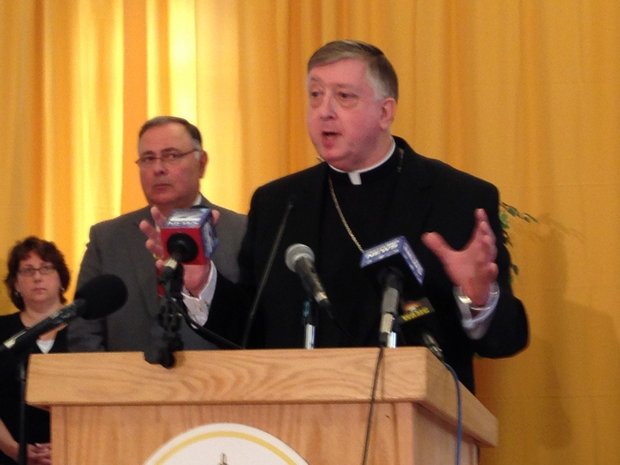Springfield Bishop Rozanski Asks for Forgiveness, Calls for Those Alienated by Catholic Church to Return in Pastoral Letter
By Dan Glaun
As the world's Catholics prepare for Lent's 40 days of spiritual repentance, the Roman Catholic Diocese of Springfield is issuing its own message of apology and renewal – to current and lapsed Catholics, to parishioners wounded by church closures, to victims of sexual abuse by priests and to LGBT Catholics alienated by the Church's stance on gay rights. In his pastoral letter issued on Ash Wednesday, the Most Rev. Mitchell T. Rozanski wrote that the church, inspired by the approachable tenor of Pope Francis' papacy, is rededicating itself to evangelism – including the welcoming-back of Catholics who no longer feel represented by the Church. "As the Diocese of Springfield, we must acknowledge this need for mercy, and ask forgiveness of God and each other for past sins and offenses. There are many people hurting in our Catholic community from the pain caused by our past failings as a diocese, as well as the grievous actions of some who ministered in our Church," Rozanski wrote. "So, before I ask anything of you, let me as your bishop be the first to apologize and ask your forgiveness. " The pastoral letter is the diocese's first to include a formal apology for Springfield's priest sexual abuse scandal, Rozanski said, though Rozanski has previously expressed sympathy for abuse victims. The Diocese has paid out over $12 million to dozens of abuse victims for the actions of clergy like former Bishop Thomas Dupre, who resigned in 2004 after the Republican reported that two former altar boys had accused him of sexual abuse. "First and foremost, I apologize to the victims of clergy sexual abuse, their families and friends, and all those scandalized by the Church's failure to protect our young people and for any lack of diligence in responding," Rozanski wrote. The letter also expressed sympathy for Catholics whose parishes have been closed in recent years, due to what the Diocese has described as demographic changes and financial realities. Read Bishop Rozanski's Ash Wednesday pastoral letter The Most. Rev. Mitchell T. Rozanski, Bishop of the Roman Catholic Diocese of Springfield, released a pastoral letter this morning as the Catholic community enters Lent. "It is never easy to make a decision to close a parish or school, places where there is so much personal and community history, as well as spiritual traditions," Rozanski wrote. "There is no doubt that even necessary decisions, carried out with the best of intentions, have caused some very real pain and have been the cause for some to distance themselves from our faith community." The Diocese hopes that people alienated from the Church, including people who felt unwelcome because of racial, cultural, gender and sexual differences, will find their way back to the Church, Rozanski wrote. Rozanski, who was the Auxiliary Bishop of Baltimore before Pope Francis appointed him to lead the Springfield Diocese in 2014, said in an interview that the letter's mea culpas were part of the Diocese' core mission – to evangelize its beliefs, especially to people who feel distanced from the Church. The letter's tone was dictated by a questionnaire the Diocese issued last fall, which drew over 3,000 responses from both current parishioners and people outside the Church, Rozanski said. Many responses evinced concerns about the Church, but also a desire to reconnect with the Catholic faith, according to Rozanski. "There were many who answered who felt a longing to come back and Pope Francis really provides us with an example with how he is reaching out," Rozanski said. The Diocese has closed over 60 churches since 2000, with some, like Mater Dolorosa in Holyoke, engaging in appeals that stretched on for years. The decisions have been driven by demographics and an aging population, Rozanski said, with many ethnic parishes -- Irish, Polish, Italian -- no longer surrounded by the immigrant communities that supported them. He said that he hoped those hurt by parish mergers could find their way back to the Church. The Diocese has no immediate plans for further closures but can not rule more out in the future, he said. "I think that as a church we're always engaged in some kind of pastoral planning, and the church is not immune to the demographic shifts that have taken place," Rozanski said. The survey also included comments from LGBT Catholics who are committed to their faith but feel alienated by the Church's long-running battle against extending legal recognition for same-sex marriage. The United States Conference of Catholic Bishops, following last June's U.S. Supreme Court decision legalizing same-sex marriage across the country, issued a press release describing the ruling as a "tragic error." The church's position has not changed, Rozanski said, but he included welcoming language in the pastoral letter in the hopes of winning back those Catholics. "We all are sinners, and the Pope includes himself in that," Rozanski said. "I think that the misconception is that because the church is opposed to gay marriage, it wants to shut all gay people out of the church. That is not the case." Overall, Rozanski said, his message as his parishioners enter Lent is one of outreach. "This is not just a program. This is a focus on who we are called to be as the Church," he said. "I'm really focusing us back to what Jesus calls us to be." dglaun@masslive.com
|
.
Any original material on these pages is copyright © BishopAccountability.org 2004. Reproduce freely with attribution.
